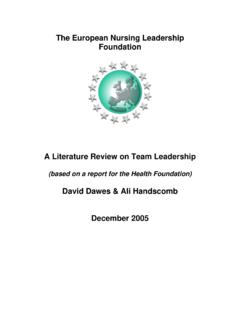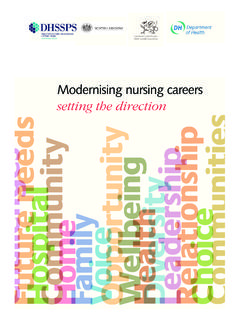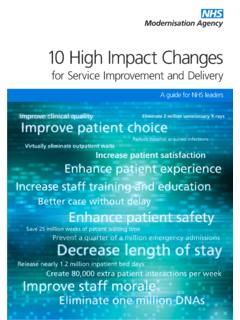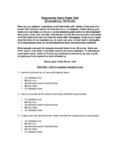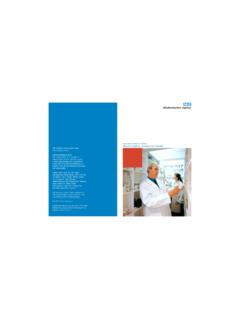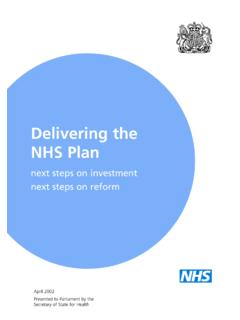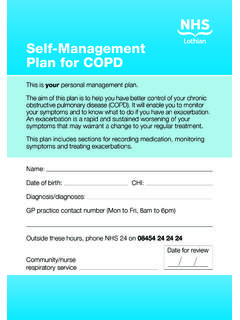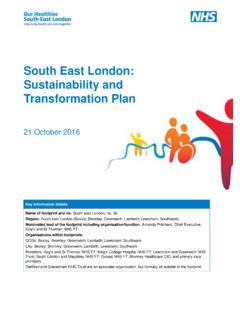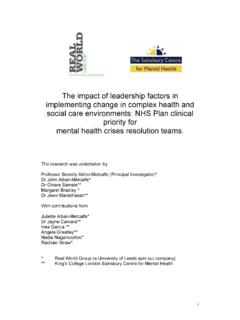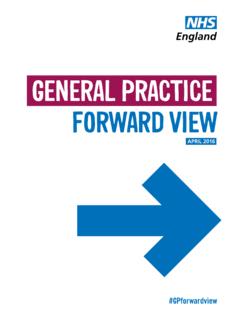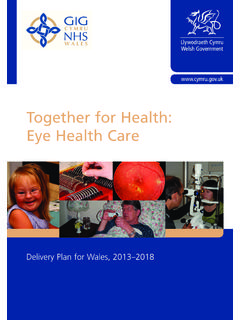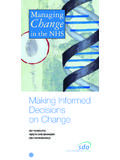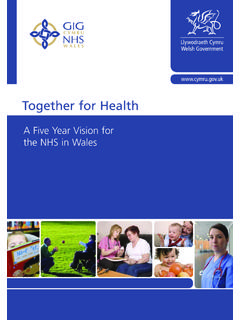Transcription of The NHS Plan - Nursing Leadership
1 Introduction1A MESSAGE FROMTHE CHIEF NURSINGOFFICERI know that you have been workinghard to manage pressures this winter,and to deliver improved care, but itis also important to take time tothink about the future. I am sendingyou this document to explain someof the challenges that lie ahead fornurses in helping to make the NHSa better place for patients and abetter place in which to work. The NHS plan is about investmentand reform. It sets out plans to givethe people of England a healthservice fit for the 21st century, ahealth service built around the needsof the patient. It also sets outambitious plans to make the NHSa better place in which to can only happen with thecommitment of staff, at every levelof the , midwives or health visitorsneed to be clear about: the fundamental aims of theNHS plan and what it will meanfor patients, staff and services the crucial role nurses will playin making these changes happen the opportunities the NHS Planoffers health professionals.
2 As the lead nurse advisinggovernment, I work closely withministers and other seniorGovernment officials to helpimplement the NHS plan . Thereis a lot to do at a national level legislation, investment,implementation of national policiesand strategies, and performancemanagement. Directors of nursingand other senior nurses andclinicians are also working hard toimplement the NHS plan at a locallevel in trusts and in primary care. Your help is needed to make thisnew agenda happen. This actionguide will help you to focus yourefforts, setting out improvementsthat all nurses, midwives and healthvisitors can help to put into your role, and whereveryou work, I know you will want tojoin me in making the NHS betterfor patients and for staff. The Nursing , midwifery and healthvisiting professions are fortunate inalready having a framework thatputs us on the front foot in tacklingthese issues (Making a Difference,DoH 1999). This national strategysets out action plans to improverecruitment and retention; reformeducation; improve working lives;modernise career paths and pay;enhance the quality of care andwork in the new and more effectiveways.
3 Significant progress hasalready been made in all these areas,but the NHS plan gives a freshimpetus to our work. This document is one of a series,aimed at different professionalgroups within the NHS. It providesuseful focussed action notes foreach individual nurse, midwife andhealth visitor, along with an accountof what the Government is doing toput new systems into place. I should like to take thisopportunity to thank you for yourhard work and commitment to the NHS. Sarah MullallyCHIEF Nursing OFFICER March 2001 The NHS plan -an action guide for nurses midwives and health visitors2 The NHS plan - an action guide for nurses, midwives and health visitorsMany nurses were involved in theconsultation on the NHS were thousands of messages from both groupswere very similar and it is thesethat form the backbone of the plan . Patients and their carers wantbetter quality care. They areparticularly concerned that thefundamentals of care are beingoverlooked hygiene, nutrition,continence, privacy and dignityfor example.
4 They want nursesto focus on these essential elementsof care. Nurses, midwives, health visitorsand patients all said they wantmore staff. They want nurses tohave more time more time tolisten, more time to care. Theywant demarcations to be brokendown between staff groups andwant the NHS to become a betteremployer. Patients also call for strongnursing and midwiferyleadership indeed many wantthe return of the matron. They wantward sisters, charge nurses andclinical leaders in primary care andpublic health who are visible andclearly in charge, setting highstandards and putting things rightquickly when they go want to see nurses,midwives and health visitors helpingto ease their pathway through thecare system. They recognise thatnurses have the potential to reducewaiting and aid access to are supportive of newnursing rolesin the acute sectorand the community, such as theCNO s ten key roles highlighted inthe NHS plan .
5 Role developmentsin NHS Direct, rapid responseteams, new public health posts andnurse and midwife consultants willhelp to meet these needs. They want to be cared for in aclean, pleasant environmentand modern buildings. Cleanlinessis a key issue for many patients, whowant nurses to have authority andcontrol over environmentalstandards. Patients want to be involved intheir own care. They want to havea say in the way their local servicesare developed. NHS users want to live healthylives. They want us to focus onthe key clinical priorities, reducingdeath, illness and stigma fromcancer, coronary heart disease andmental health. Older peopleaccount for twothirds of hospital patients. Theywant and deserve fair access toservices and for those services torespect and promote patients want fromtheir nurses, midwivesand health visitorsImprove the quality of Nursing and midwifery care 3 WHAT IS THEGOVERNMENT DOING?Nurses and midwives constantlystrive to deliver high quality tell us that we need to focuson the fundamentals of care,including safety, privacy anddignity, hygiene, nutrition andhydration, continence care, andpressure area care.
6 As the lead nursein Government, one of my keyobjectives is to improve the qualityof Nursing care in February we published TheEssence of Care , a clinical practicebenchmarking tool, developed bypatients and professionals. It isdesigned to be used by practitionersto help them make informedcomparisons and to share goodpractice in eight fundamentaland essential aspects of responsibilityfor yourindividual practice. Set high stand-ards for yourself, and deliver a good example yourselfmay be more influential than anytraining programme in improvingstandards locally. If there are validreasons why you cannot delivergood care, and you cannot resolvethese yourself, make sure youdiscuss them with your manager,and work together to resolve sure you understand yourorganisation s clinical governancearrangements, and how yourdeveloping practice could fit in withthem. Clinical Governancemeansworking in partnership, workingsmarter, learning from experienceand moving forward.
7 Is your carepatient centred? Is it safe? Is iteffective? Is it developing? Reflecton your own care, and thatof your ward team. Rejectcomplacency. Does care alwaysmeet the standard you would expectfor yourself, or your relatives? Askpatients and carers what theythink of the care you provide andto tell you honestly what aspects ofcare they find helpful, or what fallsshort of their expectations. Do notrely on complaints to tellyou if there are problems. Butwhen complaints do occur seekto resolve them early, learn fromthem and use them to shapechanges in practice. work with patients and colleaguesto identify areas of weakerpractice. explore what could be done toimprove patient care, sharingexamples of good and implement actionplans. encourage ideas from patientsand relatives, students, and allmembers of your team, whetheryoung or old, newly qualifiedor experienced, temporary orpermanent. Also ask for ideasfrom your multi-disciplinarycolleagues cleaners and porters,ward clerks, doctors andprofessions allied to medicine.
8 Monitor , don t put up with poorpractice if you witness it. Bring poorpractice to the attention of yourmanagers, colleagues and Directorof Nursing . Get to know yourTrustwhistle-blowing PlanPersonal Action PlansImprove the quality of Nursing and midwifery carePERSONALACTIONNOTE 14 The NHS plan - an action guide for nurses, midwives and health visitorsand international recruitmentis already having an Government has put in placemeasures to support nurses whochoose to return to staff is at the centre ofthis strategy through enhancedpay and career paths, continuingprofessional development, andmeasures to improve workinglives through better employmentpractice in the the NHS plan , everymember of staff in the NHS isentitled to work for an organisationwhich can demonstrate itscommitment to good employmentpractice and a range of flexibleworking conditions to help youbalance your work and personallife. By April 2003 all NHSemployers are expected to beaccredited under the ImprovingWorking Lives Government will shortly bepublishing a strategy on sure you are familiarwiththe Improving Working LivesStandard.
9 Is there a copy in yourward or Department office? Discusslocal implementation with yourown manager or team. What couldyou do to help your trust achieveaccreditation?Think aboutyour own team skills: do you participate actively inmeetings and planning sessions? do you know how to tacklebullying and harassment when itoccurs? do you know how decisions aremade in your unit or trust andhow to influence those decisions? do you work fairly and equitablywith colleagues, for example inplanning off-duty rotas? are you clear about your role, andwhat colleagues expect from you?Could you improve your owncommunication skills? do you contribute positively ornegatively to the morale of yourteam?Involve yourselfin careers orrecruitment work. Most nurses,midwives and health visitors arepassionate about their work andenjoy conveying this to others. Youcould develop a local keep in touch scheme with staff who have left forfamily reasons, who may want toreturn.
10 You could get involved withcareers visits to schools or localcommunity the present pressure onpractice placements, help newstudents, international recruits andreturners to feel welcomein yourarea of practice. It s an investmentin time and energy that will pay offfor all recruitment and retentionare both easier where clinicalplacements work you access newopportunities for training anddevelopmentthrough yourpersonal development plan . Youshould explore locally the best waysin which you can benefit from theextra money that will be invested inskills development and approaches such as jobswaps, shadowing and workexperience can energise both yourcareer and your approach to time to discuss your trainingand personal development withyour line manager and with localtraining and development 2 More staff, more timeWHAT IS THEGOVERNMENT DOING?Patients and staff agree we needmore staff. We also need moretime. Time to listen, care, planand learn.

